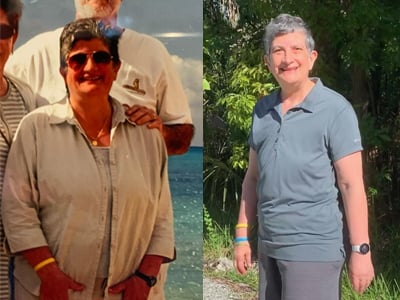Weight Loss Key to Reducing Breast Cancer Risk and Recurrence
Christine Gerace-Johnson has always been aware of her elevated risk for breast cancer.
Her father had five sisters, all of which developed breast cancer. As a result of her family history, she’s been getting yearly mammograms since she was 35 years old. She’s also undergone MRI’s and 3D mammograms. In 2018, she decided to take another aspect of her health into her own hands.
“I had begun to really look at my diet,” said Johnson. “I had gotten really overweight since menopause. I knew it was a risk factor, but I didn't have a strong enough ‘why’ at the time.”

Christine Gerace-Johnson lost 40 pounds since focusing on her diet and exercise habits.
According to a study published in the Journal of the Academy of Nutrition and Dietetics, the majority of adults in the U.S. are not meeting dietary recommendations for cancer prevention. Researchers say adults who are considered obese fall significantly short of those recommendations compared to those with a normal body mass index or who are overweight.
“There are quite a few studies that show that losing weight will decrease the risk of developing breast cancer,” said Jill Van Schaick, a nurse practitioner in Moffitt Cancer Center’s Survivorship Clinic. “If you've already developed breast cancer, it can decrease your risk for recurrent breast cancer. Women who are considered obese also may fit the category of being more sedentary and less physically active. We know that increasing physical activity can decrease the incidence of breast cancer generally and may be able to decrease the risk of recurrence.”
In December, 2019 Gerace-Johnson felt a lump in her breast.
“I had done self-breast exams my whole adult life,” Gerace-Johnson said. “I knew it was different.”
An MRI and biopsy followed. Gerace-Johnson was diagnosed with breast cancer.
“People say their diagnosis was a gift,” said Gerace-Johnson. “Now I know what they mean because it gave me my strong ‘why’ I should really change my lifestyle and I decided to make it my hobby.”
Johnson decided to stop eating saturated fats and gave up meat and dairy. She switched to a whole foods, plant-based diet, drastically reducing oil consumption along the way.
Every day she has a cup of berries, drinks green tea and eats broccoli sprouts grown in her kitchen. Several days a week she makes a green shake that has either spinach or kale, shaved turmeric, ginger, garlic and lime.
“I also try to walk every day, at least six days a week,” said Johnson. “I walk 7,500 to 10,000 steps a day just to keep moving.”
Since making the lifestyle change, she has lost nearly 40 pounds.
“None of this means I won't have a recurrence or I won't have metastases, and I know that,” said Gerace-Johnson. “But what it does mean is that I will always know that I did everything I could to try to keep myself in best health. The rest to me is in God's hands.”
According to Dr. Smitha Pabbathi, director of Moffitt’s Survivorship Clinic, when breast cancer survivors get treatment for curative intent, there is a tremendous amount of fear of recurrence.
“They've been through this huge ordeal of cancer diagnosis and treatment, and it was very arduous,” said Pabbathi. “We want our survivors to continue to be triumphant to do everything possible in their realm to modify that risk for future new cancers.”

Laurel Kohler considered herself to be morbidly obese when she was diagnosed with breast cancer in 2015. After successful surgery and chemotherapy treatments she decided to focus on improving her health.
“My choice was to get the healthiest I’m capable of, so I knew what I needed to do,” said Kohler. “I didn’t want to take any more medicine. I wanted to let my body body take care of itself. I knew nutrition would be the key.”
Kohler focused on a diet with what she considered highly-digestible, natural foods. “Fruits, vegetables, things that are already in the earth,” she said. “I like yogurts and egg whites. I recently stopped eating meat, but I still get my protein. Everybody’s got to find their forte of what they like.”

Laurel Kohler dropped nearly 200 pounds after she decided to focus on her nutrition.
As for exercise, Kohler likes to burn her calories on the dance floor. She’s always on the lookout for live music to keep her moving. Since her diagnosis in 2015, Kohler has lost nearly 200 pounds.
“Christine and Laurel really help identify such a wide spectrum of the population that are going to approach their risk reduction in actionable ways,” said Pabbathi. “It's not a one size fits all approach. They both went about it in very different ways, but they both had incredible success.”



